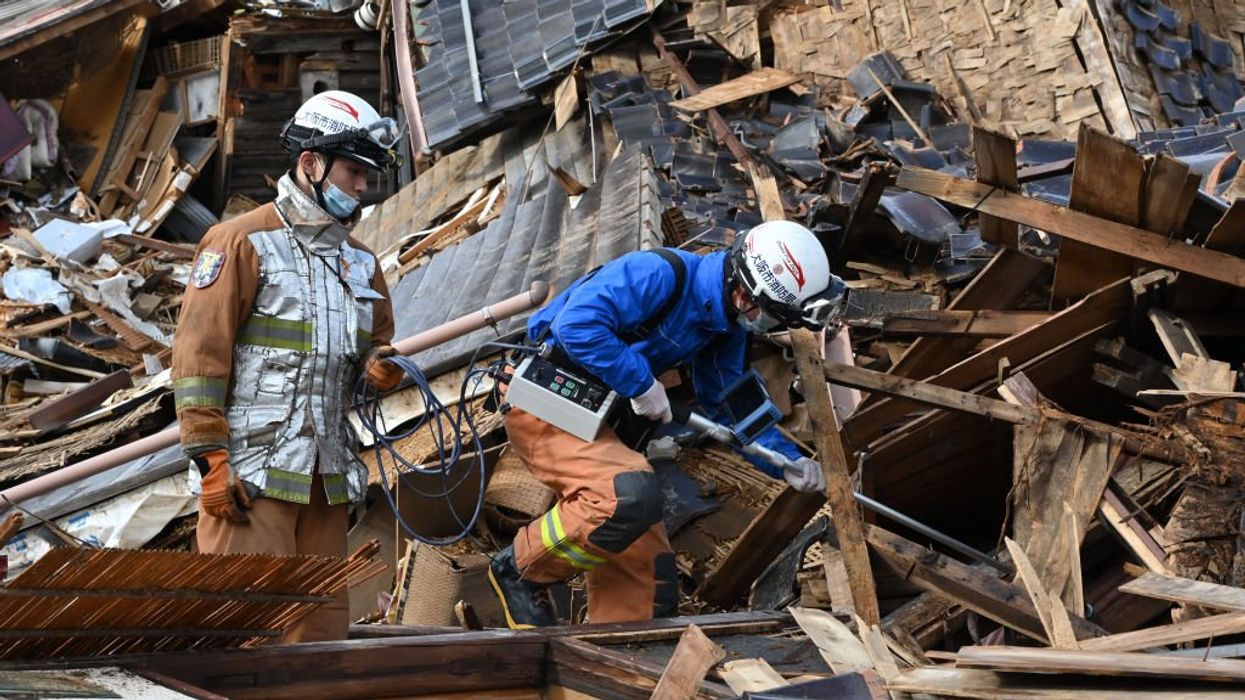Prepping is a human condition practiced across the globe for thousands of years. Customs are influenced by geography, culture, politics, and threat. Here are ten applicable observations on preparedness from around the world.
1. Argentina: Get hard.
Fernando “Ferfal” Aguirre’s The Modern Survival Manual: Surviving the Economic Collapse is required reading for preppers, and it’s chock-full of real-life lessons from his experiences during Argentina's 2001 economic crisis. But the very first thing he starts with is preparing your body and your mind so you’re not a soft target. Stop being soft. Do difficult things to develop your body and your mind. Go camping. Hit the gym. Get in shape! It’ll do wonders for your health, survivability, and confidence.
Take home point: here’s a simple weightlifting plan that most able-bodied adults can perform. Learn to stand up straight and act confident. Get your dental and health problems fixed while you can—don’t put it off for after stuff hits the fan.
2. Netherlands: Involve the kids!
The motto of the Boy Scouts of America is “Be Prepared” and the organization has taught boys wilderness and practical skills for over 100 years. The Dutch have their own version of inculcating confidence in their children via a cultural tradition known as Dutch Dropping. Kids, starting around the age of 11-12, are dropped off in the forest alone or in small groups at night with minimal gear and instructed to find their way home or to the campsite with ZERO adult assistance. Some nights are tough and miserable, but overall, the practice instills independence, decision-making skills, and is widely practiced.
Take home point: instill grit and self-confidence in your children early.
3. Israel: Always be prepared.
Entire books could be dedicated to the 10/7 attack, but the key takeaway is this: no one saw it coming. The folks attending the Supernova music festival expected a fun party, and what they got instead was hell. Israel is a bit of a special case, but the reality is you never know when a mass shooter or other disaster will strike. Never get too intoxicated, never let your guard down too much, because you never know when your life will change forever.
Take home point: you don’t have to live on hyper-alert (that is grossly unhealthy) but keep your wits about you and have a plan if things go south.
4.Taiwan: Grassroots communities are the best.

I-HWA CHENG / Contributor | Getty Images
Post-COVID and especially after the start of the Russia-Ukraine War, prepping has exploded in Taiwan. Fearing an imminent blockade and invasion, the Taiwanese have recognized their precarious position. Prepper groups have sprung up across the island and vary in their focus from all-hazards to gear geeks to weaponized resistance forces training with airsoft guns. Skills taught are varied; examples include building an emergency kit, learning first aid, and basic survival proficiencies.
However, some groups go much further and provide instruction on military simulations. Participants run the political gamut and are highly varied in their professions, reflecting a massive cross-section of the island. One common theme that appears across these groups is the adage that disaster can happen at any moment and can consist of assorted hazards. The April 2024 severe earthquake is proof positive of this understanding.
Take home point: community resilience is vital!
5. Bosnia: Get your ham radio license.
During the Bosnian War of the early 1990s, ham radio operators like Himzo Devedzija helped separated families stay in touch via radio. These days, the ubiquity of the internet and smartphones has made ham radio seem obsolete, but radio has a key advantage over more modern and user-friendly tech: it requires practically no infrastructure. Hook a radio up to a battery connected to a solar panel, throw a wire over a tree, and you’re in business. Master digital modes like Winlink and you can even send email over the air. The downside is the equipment is expensive, and you need to take tests with the FCC to obtain the necessary licenses. Your best bet is to contact your nearest ham radio club, who can help prepare you for the tests and recommend the best equipment for your area. But you can do a lot of interesting things even without a license, like listen to worldwide HF transmissions and learn how to track down radio transmitters through foxhunting.
Take home point: pick up a hobby, even if it’s not ham and make it FUN!
6. Russia: Plant a garden.
While the leadership of Russia is commonly maligned, the Russian people are damn tough. They’ve survived Genghis Khan, famines, a communist revolution, and total government collapse. One secret to Russian resiliency? Dacha gardens, which the Russian people have maintained for over 1,000 years. These small backyard gardens account for 3% of Russia’s land but provide over 50% of the country’s food, including 92% of potatoes, 77% of vegetables, 87% of fruit, 59% of meat, and 49% of milk. You don’t have to grow everything overnight, but simply starting with a single raised bed of lettuce and maybe a handful of chickens will give you invaluable real-world experience you can scale when the chips are down.
Take home point: build your resilience in bite-sized (pun intended) chunks.
7. Cyprus: Diversification saves.
During the 2013 financial crisis in Cyprus, Germany agreed to bail out the island, but with some characteristic German austerity: a tax of 6.75 percent from insured deposits up to €100,000 and a 9.9 percent from uninsured amounts over €100,000. People panicked, and Cyprus had to shut down banks for two weeks to avoid a run. Ultimately, depositors lost nearly half of their savings. The crisis in Cyprus sparked Bitcoin’s meteoric rise from obscure nerd money to a financial titan as the savvy rich realized that they couldn’t trust the banks. Of course, there are alternative places to store wealth other than a bank, but as for your liquid capital, it pays to diversify. Keep some in cash, Bitcoin, and precious metals.
Take home point: your mother was right, don’t put all your eggs in one basket.
8.Japan: Government CAN be helpful.

KAZUHIRO NOGI / Contributor | Getty Images
Japan overall, and Tokyo specifically, take disaster preparedness quite seriously. The 2024 New Years Day earthquake hammered that point home, yet again. At the national level, the Japanese Ground Self-Defense Force is habitually prepared to respond to calamity; everything from earthquakes to typhoons to tsunamis.
As a country, September 1st is nationally designated as Disaster Prevention Day, commemorating the 1923 Great Kanto Earthquake which claimed 140,000 lives. School children, businesses, theme parks, and members of the national government participate annually. At the municipal level, Tokyo publishes a very thorough and thoughtful pamphlet on preparedness for its residents (English link here: https://www.metro.tokyo.lg.jp/english/guide/bosai/index.html). Tokyo also boasts the massive Rinkai Disaster Prevention Park, near downtown, that is used both as a tourist attraction and an actual disaster response site.
Take home point: remembrance, codified in national action and tribute, contributes to a culture of preparedness.
9. Finland, Switzerland, Israel: Bunkers aren't mainstream, but the concept is widespread.
You would really have to be a tinfoil hat wearing loon to invest in a bunker, right? Wrong. Switzerland mandates either a personal bunker or a tax for a space in a public bunker. In 2023, Finland ascertained it had over 50,000 bunkers, enough to shelter nearly 90% of its population. For these countries, the shelters are due to nuclear fears. Israeli law stipulates residential homes should possess a Merkhav Mugan (translation: protected space) to protect from conventional rocket and mortar attacks. Some countries and some areas are at higher risk for conventional or nuclear attack. It is folly to ignore this.
Take home point: the need for a nuclear bunker at home should not be a top prepping priority, but many areas of the US could greatly benefit from a reinforced room (e.g. panic room, tornado, or hurricane shelter) to mitigate threats.
10. United Kingdom, Canada, Australia: International preparedness is growing.
Although the tide is turning (slowly), one negative export from America on prepping, especially to the Western World, is that prepping is fringe and even anti-social, if not downright dangerous. Fortunately, things are changing for the better. The United Kingdom is, at least anecdotally, seeing an uptick in interest. The reality series Alone Australia, a spin-off of the American show where survivalists test their wits in nature, is a hit. A December 2023 survey of Canadians found 7% considered themselves preppers with British Columbia reporting the highest levels. Given wildfires, home prices, and general angst regarding a host of potential crises, it’s not hard to see why many are changing their views regarding preparedness.
Take home point: prepping has been a human staple for millennia; the world is rediscovering this and taking action.
About the authors:
Josh Centers has no masters degrees, but he does own four chickens along with some meat rabbits on his Tennessee compound. He runs unprepared.life, the best-selling Substack newsletter on preparedness, where he discusses subjects like food storage, nuclear war preparations, homeschooling, and the importance of cleaning your dryer vents. His views absolutely do not reflect the views of the Department of Defense or the Army.
Dr. Chris Ellis has four masters degrees and earned his PhD at Cornell University. He is a Colonel in the Army who specializes in a variety of disaster and homeland defense initiatives. His views are from his studies and experience and do not necessarily reflect the views of the Department of Defense, the Army, or his current command. Sadly, Chris does not own any chickens.

 ANGELA WEISS / Contributor | Getty Images
ANGELA WEISS / Contributor | Getty Images
 Eric Lee / Stringer | Getty Images
Eric Lee / Stringer | Getty Images Andrew Harnik / Staff | Getty Images
Andrew Harnik / Staff | Getty Images